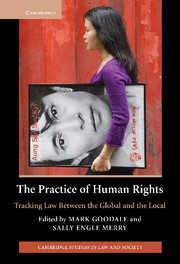Book contents
- Frontmatter
- Contents
- Contributors
- Acknowledgments
- Introduction Locating rights, envisioning law between the global and the local
- PART ONE STATES OF VIOLENCE
- PART TWO REGISTERS OF POWER
- PART THREE CONDITIONS OF VULNERABILITY
- Introduction
- 5 Rights to indigenous culture in Colombia
- 6 The 2000 UN Human Trafficking Protocol: rights, enforcement, vulnerabilities
- PART FOUR ENCOUNTERING AMBIVALENCE
- Conclusion Tyrannosaurus lex: the anthropology of human rights and transnational law
- Index
- References
5 - Rights to indigenous culture in Colombia
Published online by Cambridge University Press: 29 March 2011
- Frontmatter
- Contents
- Contributors
- Acknowledgments
- Introduction Locating rights, envisioning law between the global and the local
- PART ONE STATES OF VIOLENCE
- PART TWO REGISTERS OF POWER
- PART THREE CONDITIONS OF VULNERABILITY
- Introduction
- 5 Rights to indigenous culture in Colombia
- 6 The 2000 UN Human Trafficking Protocol: rights, enforcement, vulnerabilities
- PART FOUR ENCOUNTERING AMBIVALENCE
- Conclusion Tyrannosaurus lex: the anthropology of human rights and transnational law
- Index
- References
Summary
INTRODUCTION
This chapter uses three cases from indigenous Colombia to examine the at times awkward relationship between the set of “basic” human rights seen to reside in individuals (e.g., the right to be free from killing, torture, or forced exile) and a set of collective rights known as “rights to culture” (also known as “rights to difference”). Both sets of rights appear in various covenants and treaties to which the country has been a signatory, and they share some – but only some – of the same intellectual and moral underpinnings. I also examine the problematic way both the Colombian government and indigenous communities (henceforth pueblos) appeal to a discourse of culture when disputes arise over who is entitled to claim the “right to culture.” The conflicts these three cases illustrate have arisen in no small part due to the fact that campaigns supporting basic human rights, and the mobilizations around indigenous rights, have emerged out of significantly different histories.
I have been conducting research since 1968 on various topics in the Vaupés, a department in the southeastern part of the country. In the early 1980s I became interested in the indigenous rights mobilizing taking place in the region, and subsequently expanded that interest to include the organizing at the national and international levels (see Warren and Jackson 2002; Jackson and Warren 2005).
- Type
- Chapter
- Information
- The Practice of Human RightsTracking Law between the Global and the Local, pp. 204 - 241Publisher: Cambridge University PressPrint publication year: 2007
References
- 57
- Cited by



